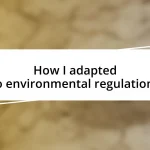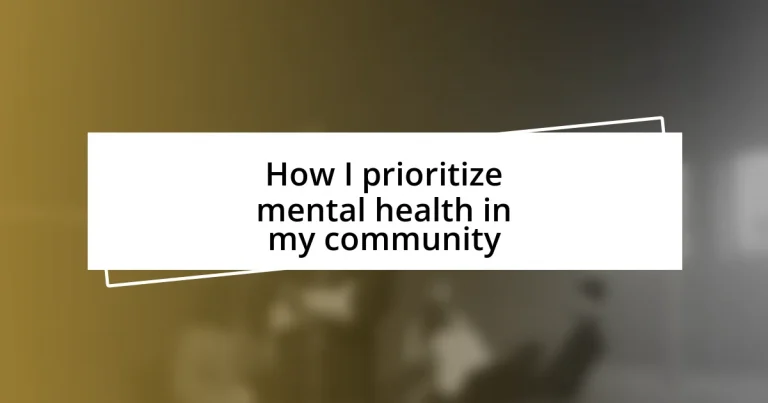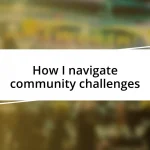Key takeaways:
- Mental health awareness fosters community connection and reduces stigma, encouraging open conversations about feelings and struggles.
- Identifying and addressing community mental health needs requires engagement through discussions, surveys, and collaboration with professionals.
- Sustaining mental health efforts relies on continuous community involvement, diverse perspectives, and follow-up to nurture long-term support and adaptation.
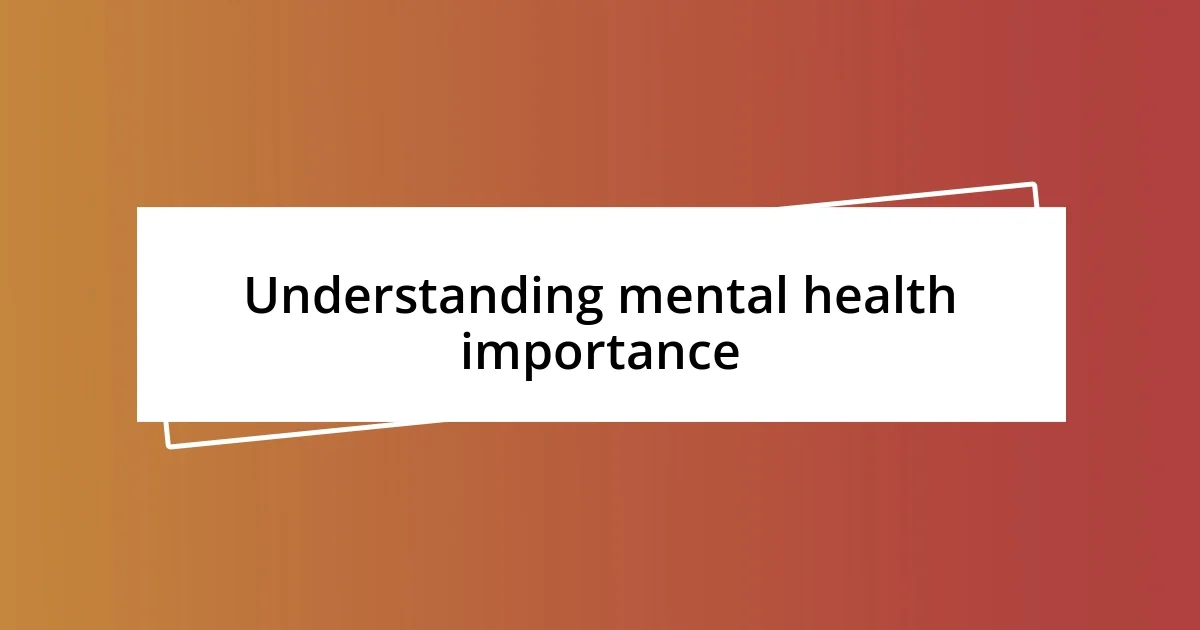
Understanding mental health importance
Mental health is far more than just the absence of mental illness; it profoundly influences every aspect of our lives. I’ve seen firsthand how one person’s struggles can ripple through their family and friends, causing a collective impact in our community. Isn’t it fascinating how a single conversation about feelings can foster stronger connections and break down walls of stigma?
Reflecting on a friend who once faced anxiety, I remember the fear and isolation she experienced. Whenever we had gatherings, she would often hang back, feeling overwhelmed. When we finally sat down to talk about her feelings, it became clear just how vital it was to create an environment where mental health was acknowledged and embraced. This led me to wonder, how many others are silently suffering because the importance of mental health isn’t openly discussed?
Indeed, understanding mental health involves recognizing its critical role in overall well-being. When we prioritize mental health, it creates a foundation for open dialogue, support, and ultimately healing. Can we imagine a community where each member feels safe to express their struggles without fear of judgment? The potential for growth and compassion in our communities is boundless when we acknowledge and advocate for mental health awareness.
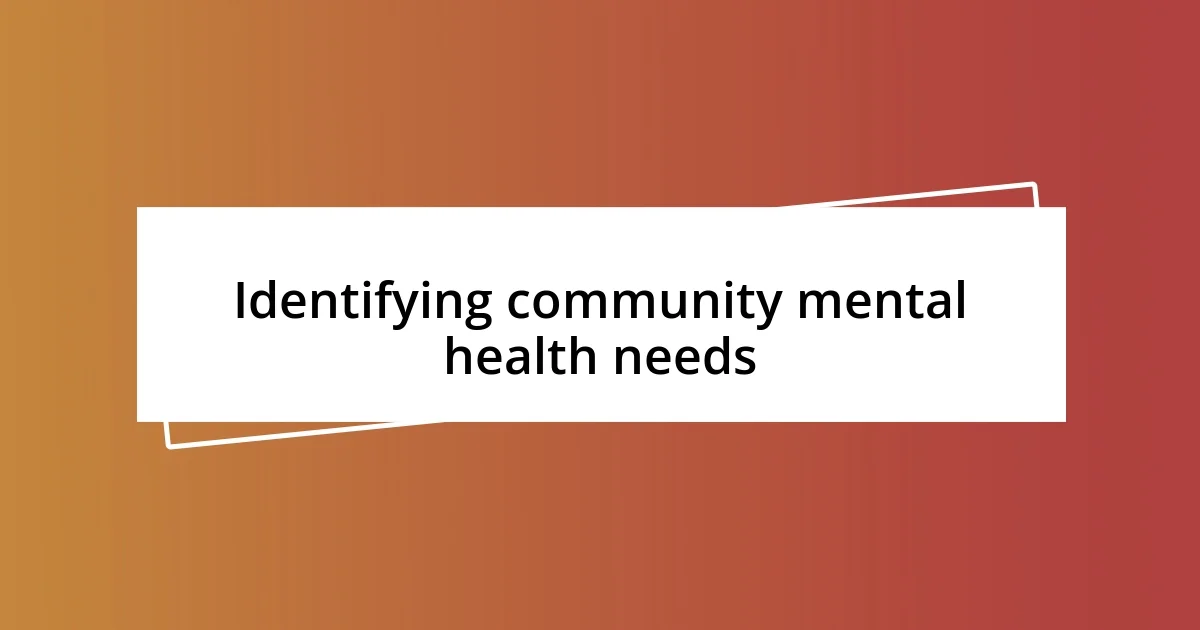
Identifying community mental health needs
Identifying community mental health needs requires a keen understanding of the unique challenges individuals face within their specific environments. For example, I recall attending a community meeting where local residents shared their experiences related to stressors like unemployment and substance abuse. These discussions revealed underlying issues that many were grappling with, showing me just how essential it is to listen and engage with the community to pinpoint their specific mental health requirements.
It’s also crucial to utilize surveys or informal gatherings to gather insights. I once organized a small workshop that focused on mental well-being, and the feedback was eye-opening. Participants expressed concerns about the lack of accessible resources and safe spaces to talk about their feelings. This experience made it clear that identifying needs is not just about statistics; it’s about creating opportunities for people to share their stories, which can illuminate the mental health priorities in our community.
Lastly, collaborating with local mental health professionals can enhance our understanding of these needs. I partnered with a therapist who conducted a needs assessment for our area, and it brought to light issues like the stigma surrounding therapy and the scarcity of culturally competent resources. This collaboration underscored that real change stems from both community engagement and professional insight, emphasizing the necessity for a comprehensive approach to recognizing and addressing mental health needs.
| Method | Description |
|---|---|
| Community Discussions | Engaging residents in conversations to identify specific mental health challenges they face. |
| Surveys and Feedback | Gathering insights through informal gatherings or structured surveys to understand community sentiments and needs. |
| Professional Collaborations | Working with mental health professionals to accurately assess and address identified community needs. |
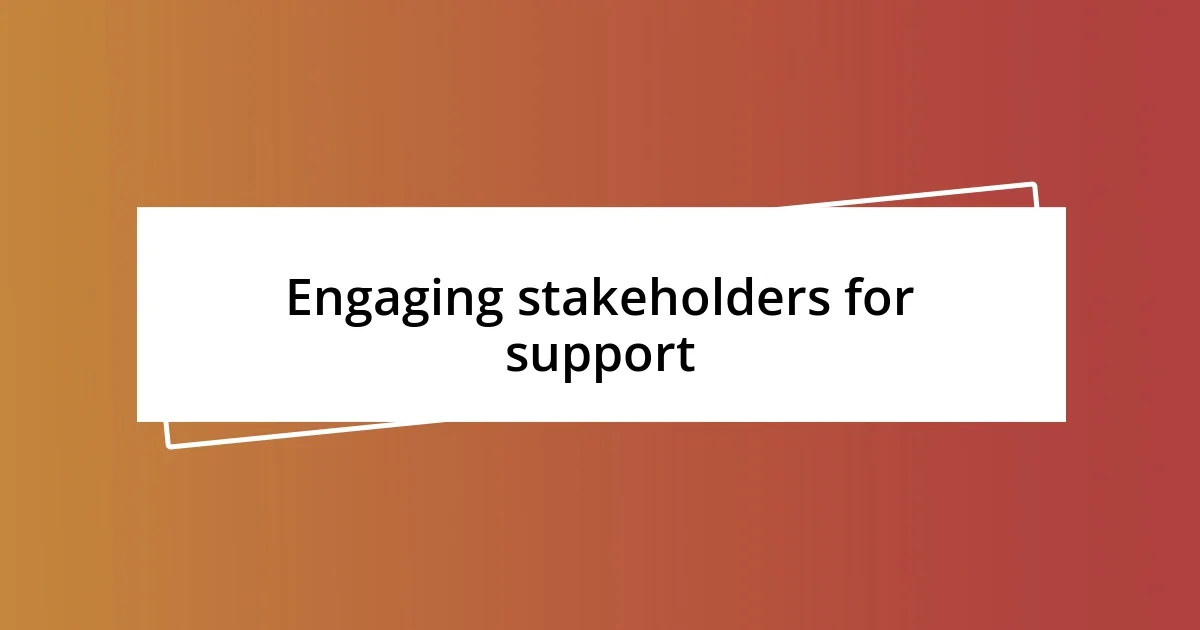
Engaging stakeholders for support
Engaging stakeholders for support is crucial in fostering a solid network for mental health awareness. I vividly recall when I reached out to local businesses to become allies in our community mental health initiatives. Their willingness to participate not only elevated the conversation but also encouraged employees to address their own mental well-being. It was heartening to see how partnerships begin to flourish, with each stakeholder bringing unique resources and perspectives to the table.
- Local Businesses: Collaborating with businesses can help create supportive workplaces and promote mental health resources to employees.
- Schools and Universities: Engaging educational institutions ensures that mental health education is integrated into the curriculum, reaching the youth early.
- Healthcare Providers: Building relationships with local healthcare professionals leads to a better understanding of mental health challenges within the community and more tailored resources.
- Nonprofit Organizations: Partnering with nonprofits can enhance outreach efforts, as they often have established networks and expertise in mental health advocacy.
- Community Leaders: Involving local leaders can amplify our message, encouraging wider participation and lending credibility to mental health initiatives.
These experiences have shown me that genuine collaboration breeds a sense of community ownership over mental health issues, creating a ripple effect that positively impacts so many lives. I recall a moment when a small business owner shared how their mental health initiatives sparked conversations among their employees, resulting in unexpected connections and support systems. It all starts with engaging stakeholders who are ready to invest in mental health and well-being.
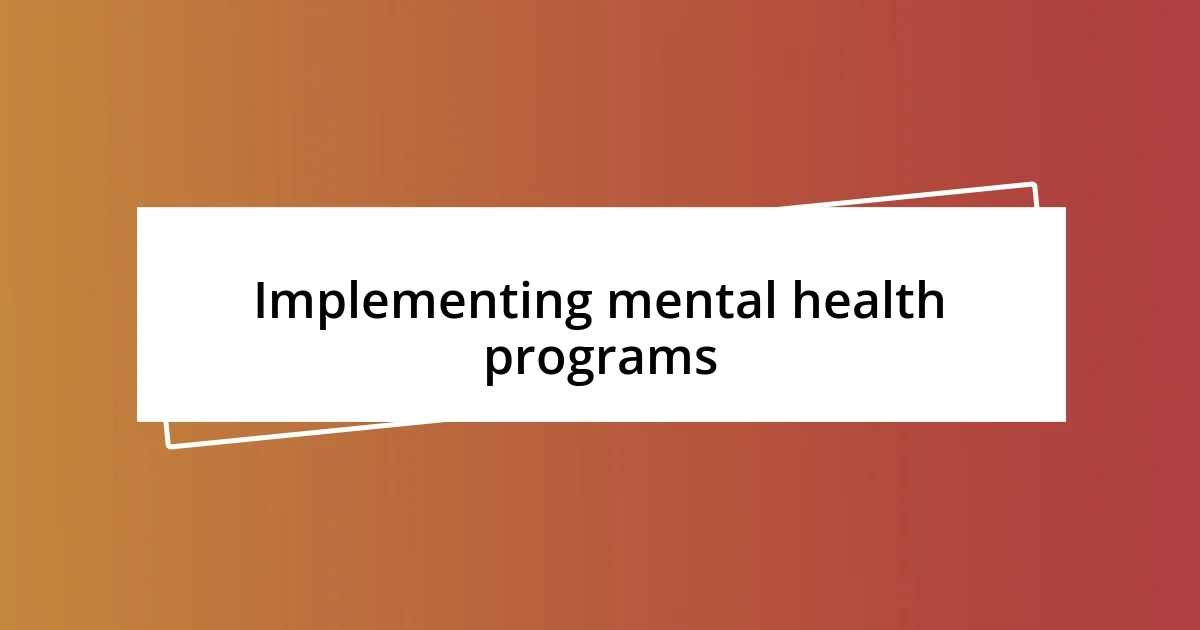
Implementing mental health programs
Implementing mental health programs is essential for creating supportive environments where individuals feel safe to discuss their mental health challenges. I remember one particular event where we introduced a program focused on mindfulness and stress reduction. The response from participants was remarkable; you could see how eager they were to learn techniques that could help them cope with everyday pressures. It was fulfilling to witness them leaving with practical strategies, feeling empowered to not just take care of themselves but to also support others in their lives.
In another instance, we piloted a peer support group aimed at young adults. The first few sessions felt a bit awkward, almost like attending an unfamiliar party. But gradually, participants began to open up, sharing personal stories that resonated deeply with one another. It’s moments like these that remind me of the importance of creating safe spaces where vulnerability is not only welcomed but encouraged. How can we expect people to prioritize mental health if they don’t feel they have a place to share their struggles?
One of the most impactful aspects of our mental health programs has been the involvement of community ambassadors—individuals who have lived experience with mental health issues. I can’t tell you how powerful it is to watch these ambassadors connect with others, providing both insight and hope. They often say things like, “I’ve been there,” which instantly breaks down barriers. It’s a reminder for me that if we want to cultivate a culture of support, we need to include voices that reflect the community’s diverse experiences.
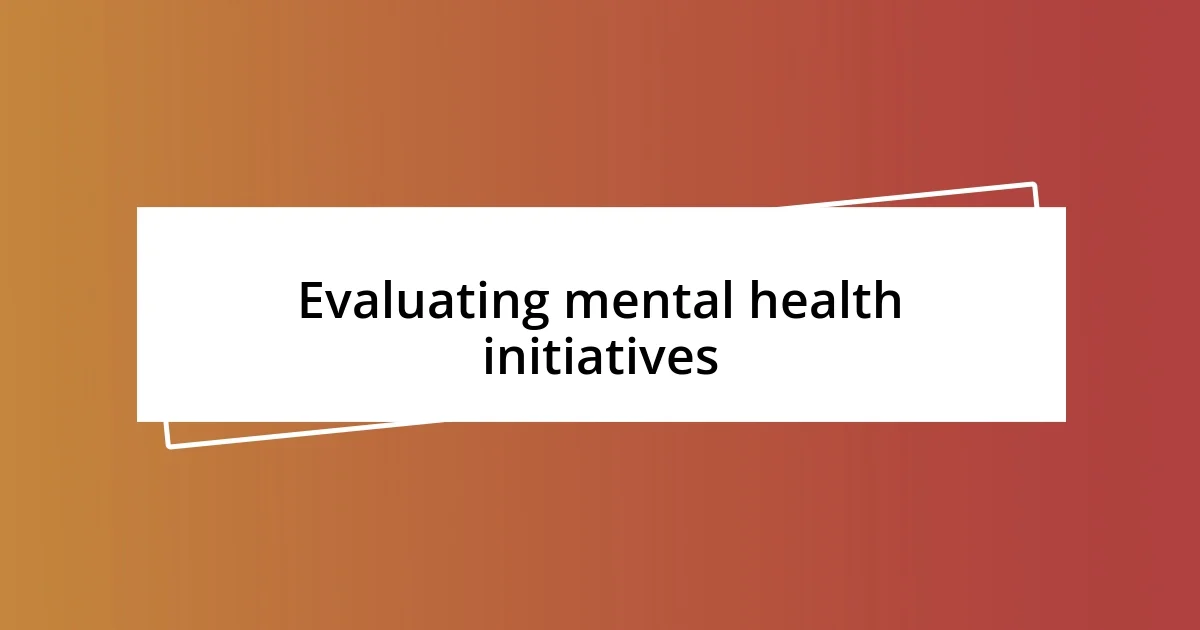
Evaluating mental health initiatives
Evaluating mental health initiatives is not just about measuring success; it’s about understanding the impact on our community. I remember sitting in a meeting where we reviewed feedback from participants in a recent mental health workshop. Their stories revealed insights that statistics simply couldn’t capture, like the profound relief someone felt when they realized they weren’t alone in their struggles. It made me question: how often do we really listen to the voices of those we aim to help?
When assessing the effectiveness of these initiatives, I consider not only participation numbers but also the depth of engagement. For instance, after a local health fair, I chatted with attendees who shared how the connection with mental health resources helped them seek therapy for the first time. Their excitement was palpable, and it reinforced for me that success isn’t merely about attendance; it’s about fostering genuine connections that lead to transformative experiences. Don’t we owe it to ourselves to dig deeper into these narratives?
Surprisingly, I’ve found that evaluations can reveal gaps we never anticipated. During one assessment, we discovered that certain demographics weren’t utilizing our mental health programs. This prompted us to redesign our outreach efforts, ensuring we met people where they were. It was a reminder that evaluation is an ongoing process, one that requires us to adapt and grow continually. How can we champion mental health if we ignore the voices of those who need it the most? This realization drives home the importance of not just evaluating programs but listening, learning, and evolving.
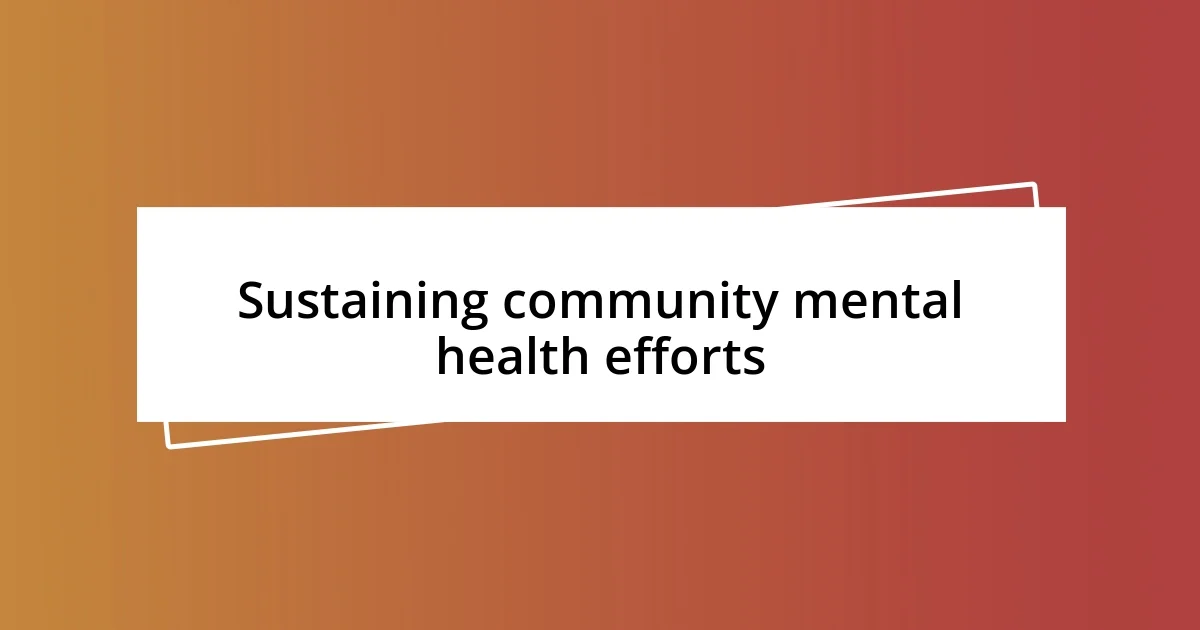
Sustaining community mental health efforts
Sustaining mental health efforts in the community requires continuous engagement and a commitment to addressing evolving needs. I recall a community meeting where we came together to brainstorm ways to keep our mental health programs relevant. As different voices filled the room, it struck me how essential it is to include diverse perspectives. Each suggestion—from hosting more interactive workshops to increasing online resources—reflected the many layers of struggle we all face. How can we sustain our efforts without making room for everyone’s input?
One approach I’ve seen work well is forming partnerships with local organizations. When my friend reached out to a local gym to co-host wellness events, it created a ripple effect. Suddenly, participants were not only learning about mental health but also discovering new ways to integrate self-care into their daily routines. I’ve witnessed firsthand how strengthening these connections fosters a sense of community ownership over mental health initiatives. It’s a beautiful reminder that we can support each other in myriad ways, often in places we least expect.
Additionally, I believe that follow-up is key to sustaining our mental health efforts. After launching a series of workshops, I took the time to check in with attendees through social media. The response was heartwarming; many appreciated the ongoing dialogue. Some shared how they were applying techniques from the sessions in their lives. When I read their messages, I felt a strong sense of accountability toward them. It’s these small actions that can ignite a spark of sustained effort and show that we are in this together. How can we nurture our community if we don’t continue the conversation?







